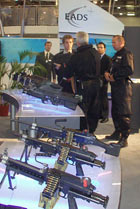Publisher to End Arms Affair
Submitted by Bob Burton on


Submitted by Bob Burton on

Submitted by Diane Farsetta on
Nike says that its corporate social responsibility (CSR) campaign is no longer just "a risk and reputation management tool," but a core "business objective." Labor rights activist Jeff Ballinger is skeptical.
Submitted by John Stauber on

Submitted by Bob Burton on

Submitted by Diane Farsetta on
Indonesia, the world's most populous Muslim country, has had a complicated relationship with the U.S., especially during the Indonesian military's occupation of neighboring East Timor. After 9/11, however, the U.S. has increasingly dismissed human rights concerns to provide Indonesia with military aid.
Submitted by Bob Burton on
A watchdog group that criticized the social and environmental failings of the Australian government's overseas aid policies has been stripped of its charitable tax status.
Submitted by Diane Farsetta on
Fairness & Accuracy In Reporting (FAIR) is criticizing U.S.
Submitted by Diane Farsetta on
U.S.
Submitted by Diane Farsetta on
After giving an interview to Afghanistan's Tolo TV in which she called the Afghan parliament "worse than a stable or a zoo," because "at least there you have a donkey that carries a load and a cow that provides milk," Malalai Joya was suspended from Parliament.
 In their groundbreaking 1988 book, Manufacturing Consent, professors Ed Herman and Noam Chomsky not only explained, but documented with extensive case studies, how mass media and public opinion are shaped in a democracy. Twenty years later, can their "propaganda model" still be used to explain modern media distortions? That was one of the main questions discussed last week at a conference in Windsor, Ontario, titled "20 Years of Propaganda?" Organized by Dr. Paul Boin, the conference drew hundreds of scholars and activists including myself, and more than 1,000 people attended a closing speech by Chomsky on May 17.
In their groundbreaking 1988 book, Manufacturing Consent, professors Ed Herman and Noam Chomsky not only explained, but documented with extensive case studies, how mass media and public opinion are shaped in a democracy. Twenty years later, can their "propaganda model" still be used to explain modern media distortions? That was one of the main questions discussed last week at a conference in Windsor, Ontario, titled "20 Years of Propaganda?" Organized by Dr. Paul Boin, the conference drew hundreds of scholars and activists including myself, and more than 1,000 people attended a closing speech by Chomsky on May 17.
Center for Media and Democracy (CMD)
520 University Ave, Ste 305 • Madison, WI 53703 • (608) 260-9713
CMD is a 501(c)(3) tax-exempt non-profit.
© 1993-2025